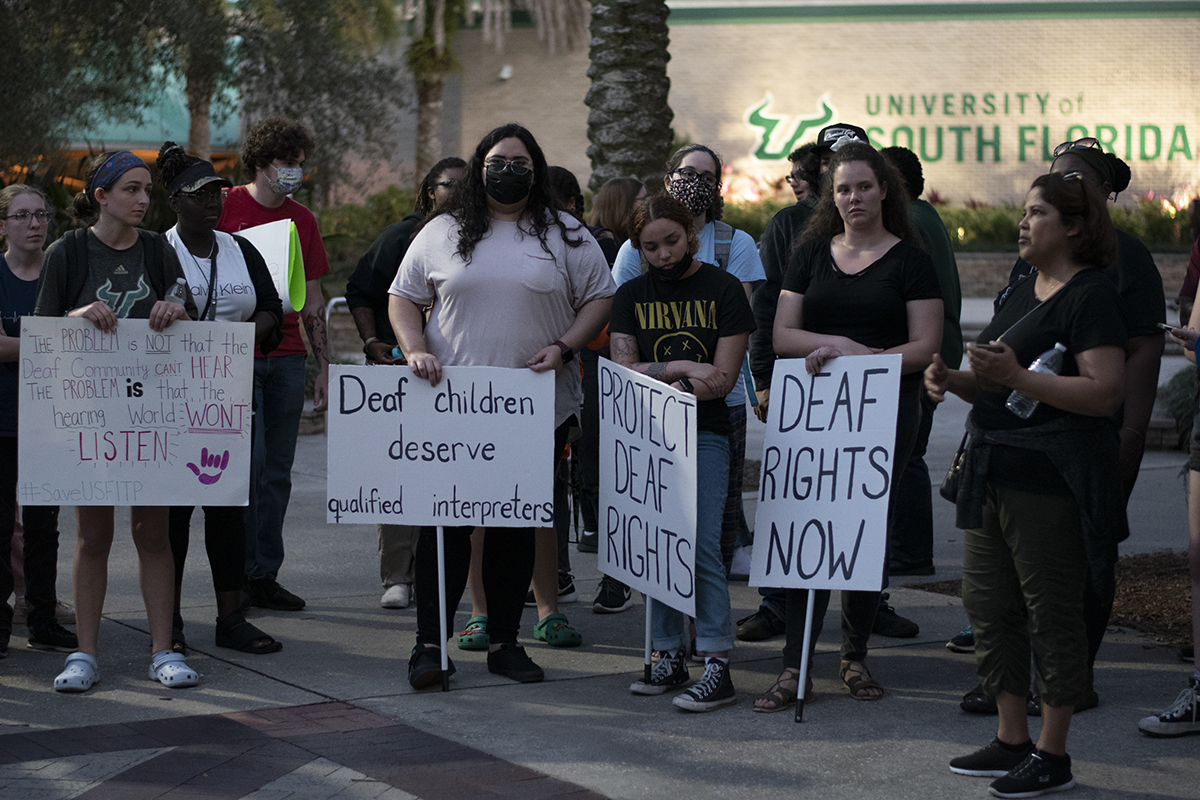Pictured above: Dozens of demonstrators stood outside the Marshall Student Center at USF Tampa on Feb. 17 following recent rumors of the ASL program’s dissolution.
Courtesy of Aubrey Carr | The Crow’s Nest
By Aubrey Carr
Despite recent appeals on social media to save the University of South Florida’s American Sign Language (ASL) Interpreting and Deaf Studies major, there are currently no official plans to cease the program.
Still, dozens demonstrated outside of USF Tampa’s Marshall Student Center on Thursday to advocate for the rights of Deaf and Hard-of-Hearing individuals.
“Deaf children deserve qualified interpreters,” one sign said.
Although no official statement was made by the university, rumors that the major was being terminated spread on Facebook and Instagram last Tuesday morning.
By that evening, a change.org petition was created by students to rally support for the ASL program and put a stop to its alleged closure. As of last Thursday, the petition, “HELP SAVE THE USF INTERPRETING PROGRAM!” had over 12,000 signatures.
“[USF] is one of [only] two universities in the state of Florida that provide an American Sign Language Interpreting program,” Paige Cooley, an ASL Interpreting student said in the petition’s description. “[Last] week, with no warning and very little explanation, it has been announced that this Interpreting program will be ending.”
College of Behavioral and Community Sciences (CBCS) Dean Julie Serovich posted a statement on Facebook last Thursday addressing the public concern over the possible closure of the ASL Interpreting and Deaf Studies major.
“A recent communication in the [CBCS] at the University of South Florida inaccurately stated that a decision was made to end an undergraduate major in American Sign Language and Interpreting. No such decision has been made,” Serovich said.
Although no definite conclusion had been made, the CBCS planned to recommend the discontinuation of the major as part of USF’s annual productivity review, Serovich said.
In her statement, Serovich assured that no proposal was submitted or reviewed by university leadership –– a necessary step in the termination of any program.
Ralph Wilcox, provost and executive vice president, shared a similar statement to Serovich’s during last Wednesday’s Faculty Senate meeting.
“That communication was made in error. I had no knowledge of [the program’s termination] until my mailbox started to fill up early [Tuesday] morning with understandably concerned citizens,” Wilcox said.
“The program is not terminated.”
Wilcox said any decision regarding the program’s discontinuation would have to go through the university’s hierarchy of leadership.
“No recommendation has landed on my desk, and in fact we’ve made it very clear that without such a recommendation following due process, where faculty at the department level review and take action to recommend at the college level, and then on to the Faculty Senate, and then in this case, the Graduate Council. Only then would I ever entertain taking action on a particular proposal,” Wilcox said.



